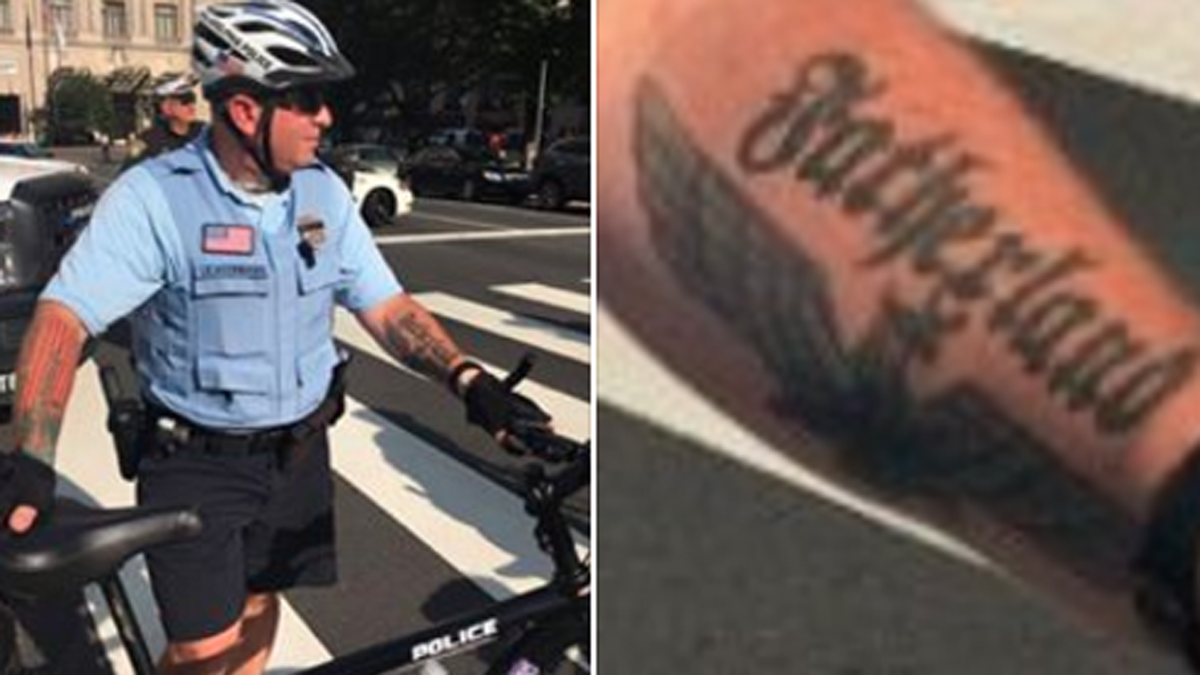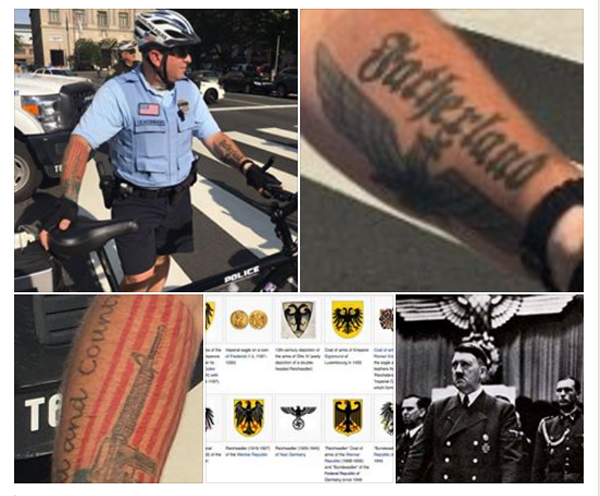Complaint filed against Philly cop for apparently Nazi-inspired tattoos

A screenshot of images posted on the Facebook page of Evan Parish Matthews along with text alerting the public that an official complaint was filed against Officer Lichtermann (Image via Evan Parish Matthews/https://www.facebook.com/evan.p.matthews/posts/10154380155147778)
An activist who snapped photos of a Philadelphia police officer with apparently Nazi-inspired tattoos on his arms has filed a complaint against him, saying the tattoos violate the department’s code of conduct and questioning his continued employment.
Evan Parish Matthews, who took the photos of Officer Ian Hans Lichtermann at the Black Resistance March on July 26 during the Democratic National Convention in Philadelphia, posted the images on Facebook Wednesday night, along with the text of a complaint he said was filed against the officer.
“The idea of being stopped, questioned, arrested, or of even passing this officer on the street, Nazi insignias inscribed on his body with needle and gun, tattoo in plain sight, in a dominant placement on his body, is, in its most literal and modern sense, terrifying,” the complaint reads. “If Philadelphia police officer Lichtermann was to put you in a chokehold, you would be staring directly at a PPD uniform and the insignia of Adolph (sic) Hitler’s Nazi party.”
 A screenshot of images posted on the Facebook page of Evan Parish Matthews along with text alerting the public that an official complaint was filed against Officer Lichtermann (Image via Evan Parish Matthews/https://www.facebook.com/evan.p.matthews/posts/10154380155147778)
A screenshot of images posted on the Facebook page of Evan Parish Matthews along with text alerting the public that an official complaint was filed against Officer Lichtermann (Image via Evan Parish Matthews/https://www.facebook.com/evan.p.matthews/posts/10154380155147778)
In a blog post Wednesday, Philly Antifa, an anti-fascist and anti-authoritarian group, wrote that hackers in 2011 listed Lichtermann as a member of the white supremacist group Blood and Honour. The group also posted photos, from Lichtermann’s Flickr account (suspended this morning), of the officer at an apparent World War II re-enactment dressed as a Nazi soldier.
The department responded today with this statement:
“The Philadelphia Police Department is aware of the image being displayed and circulated on social media. The post and photograph of the officer with tattoos displayed on his forearms was brought to our attention this morning, and we have forwarded it to internal affairs for review. Currently, the department does not have a specific policy regarding the wearing/displaying of tattoos; however, the department will quickly move to assess and determine the appropriate policy moving forward. The Department does not condone anything that can be interpreted as offensive, hateful or discriminatory in any form. This is a very sensitive topic for both the citizens that we serve as well as the officers providing service to the public. We must ensure that all constitutional rights are adhered to while at the same time ensuring public safety and public trust aren’t negatively impacted.”
Cameron Kline, a spokesman for Philadelphia District Attorney Seth Williams, said his office is “looking into it.”
Lichtermann has been on the police force since 2000, according to city records.
Daryle Lamont Jenkins, founder of the anti-hate group One People’s Project, said he discovered Lichtermann’s name on the hacker’s list about five years ago and reported him to the police department’s public affairs officers.
“They told me it would have to be investigated,” Jenkins said.
Jenkins added: “He is expressing what amounts to, for some people, his First Amendment rights. But when you see a ‘Fatherland’ tattoo and [a tattoo of] an eagle with those wings outstretching, you know exactly what that tattoo represents. If we’re having to convince the police in this country that black lives matter, and we come across an officer in this city who says ‘no, they don’t,’ we’re going to be concerned. We do not want people like that in the police department.”
Several veteran defense attorneys who represent minority defendants and have fought police misconduct found the case troubling as well.
“Police officers like everybody else have a right to their own political views and judgments,” said David Rudovsky, a prominent civil-rights attorney. “However, where those views are extremist, to the point of advocating white supremacy, for example, or Nazi philosophy, that’s going to be very problematic for the police department and this police officer. Any police department should be very wary of having officers who have those beliefs and act on it. I want to be very clear that I do not know whether this officer has those beliefs or acts on them. But I would think the department would be making some sort of inquiry.”
Attorney Guy Sciolla agreed, saying such personal beliefs could call an officer’s biases into question and impact the outcome of a case.
“[Lichtermann] has First-Amendment rights, absolutely, as we all do. And a lot of people participate in reenactments of all sorts of wars; that doesn’t mean the person possesses that point of view,” Sciolla said. “But a lawyer would be duty-bound to explore it [in defense of a client] insofar as its impact on the person’s job.”
Elsewhere, officers have lost their jobs for their white-supremacy ties. The FBI warned in 2006 that white supremacists were known to try to infiltrate law enforcement.
“That a police officer would have such obviously offensive tattoos plainly visible is beyond troubling,” said attorney Bradley Bridge of the Defender Association of Philadelphia. “At a time when racial disparities and police misconduct have come into sharp focus, it is a major concern that a police officer would be involved in a racist, white supremacist group. The public’s perception of a police officer’s objectivity and fairness, so critical to success in their job, is undermined by such a display. How can the police honor, serve and protect the public when messages of hate and intolerance are openly proclaimed?”
He added: “As defense attorneys, we would certainly probe the Nazi sympathizer police officer for biases as that would go the officer’s credibility before the factfinder. We will also examine past cases involving this officer to see if there is an improper pattern of arrests.”
WHYY is your source for fact-based, in-depth journalism and information. As a nonprofit organization, we rely on financial support from readers like you. Please give today.




